动词ing形式的用法及练习题(经典)
高考英语专题复习《ing形式作主语和宾语》练习题含答案
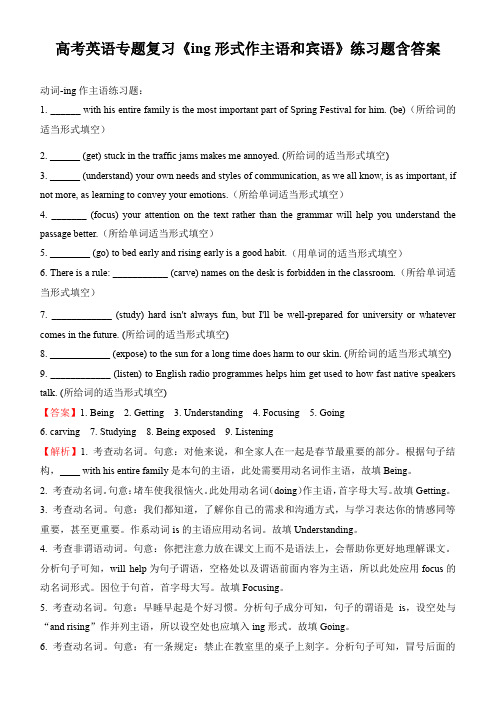
高考英语专题复习《ing形式作主语和宾语》练习题含答案动词-ing作主语练习题:1. ______ with his entire family is the most important part of Spring Festival for him. (be)(所给词的适当形式填空)2. ______ (get) stuck in the traffic jams makes me annoyed. (所给词的适当形式填空)3. ______ (understand) your own needs and styles of communication, as we all know, is as important, if not more, as learning to convey your emotions.(所给单词适当形式填空)4. _______ (focus) your attention on the text rather than the grammar will help you understand the passage better.(所给单词适当形式填空)5. ________ (go) to bed early and rising early is a good habit.(用单词的适当形式填空)6. There is a rule: ___________ (carve) names on the desk is forbidden in the classroom.(所给单词适当形式填空)7. ____________ (study) hard isn't always fun, but I'll be well-prepared for university or whatever comes in the future. (所给词的适当形式填空)8. ____________ (expose) to the sun for a long time does harm to our skin. (所给词的适当形式填空)9. ____________ (listen) to English radio programmes helps him get used to how fast native speakers talk. (所给词的适当形式填空)【答案】1. Being 2. Getting 3. Understanding 4. Focusing 5. Going6. carving7. Studying8. Being exposed9. Listening【解析】1. 考查动名词。
动词ing形式的用法及变化规则
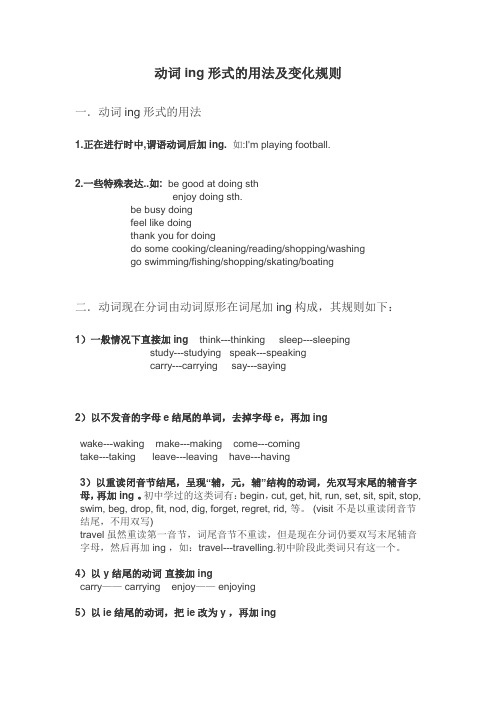
动词ing形式的用法及变化规则一.动词ing形式的用法1.正在进行时中,谓语动词后加ing. 如:I'm playing football.2.一些特殊表达..如: be good at doing sthenjoy doing sth.be busy doingfeel like doingthank you for doingdo some cooking/cleaning/reading/shopping/washinggo swimming/fishing/shopping/skating/boating二.动词现在分词由动词原形在词尾加ing构成,其规则如下:1)一般情况下直接加ing think---thinking sleep---sleepingstudy---studying speak---speakingcarry---carrying say---saying2)以不发音的字母e结尾的单词,去掉字母e,再加ingwake---waking make---making come---comingtake---taking leave---leaving have---having3)以重读闭音节结尾,呈现“辅,元,辅”结构的动词,先双写末尾的辅音字母,再加ing 。
初中学过的这类词有:begin,cut, get, hit, run, set, sit, spit, stop, swim, beg, drop, fit, nod, dig, forget, regret, rid, 等。
(visit 不是以重读闭音节结尾,不用双写)travel虽然重读第一音节,词尾音节不重读,但是现在分词仍要双写末尾辅音字母,然后再加ing ,如:travel---travelling.初中阶段此类词只有这一个。
4)以 y 结尾的动词直接加 ingcarry—— carrying enjoy—— enjoying5)以ie结尾的动词,把ie改为y ,再加ingdie---dying lie---lying要特别注意有些动词没有进行时态.1、表示状态、思想、感情和感觉的动词,如:see, hear, love, know, want, hope, think等,没有进行时态。
动词-ing形式(专项练习)(解析版)

动词-ing形式精准训练一、单选题1.I still remember to the Famen Temple and what I saw there.A.to takeB.to be takenC.takingD.being taken1. 【解析】 D 记得做过某事要用动词的-ing形式, I与take之间被动的关系, 所以D项正确。
2.There are hundreds of visitors _______ in front of the Art Gallery to have a look at Van Gogh’s paintings.A.waitedB.to waitC.waitingD.wait2.C【解析】本题考查现在分词作后置定语。
“正在等候的参观者”, 所以选C项。
3.Listen! Do you hear someone __________for help?A.callingB.callC.to callD.called3.A 【解析】该空所填内容在句中为非谓语动词作宾语补足语, 根据someone与call的主动关系判断, 排除D项。
hear后接不定式作宾语补足语时应省略to, 由此排除C项。
由listen可判断出此处表示有人正在求救, 可排除B项, 故选A项。
4.He had wonderful childhood, _____with his mother to all corners of the world.A.travelB.to travelC.traveledD.traveling4.D 【解析】主语(he)与动词travel之间存在主动关系, 故用traveling作伴随状语, 故选D。
5. at my classmates' faces, I read the same excitement in their eyes.A.LookingB.LookC.To lookD.Looked5. A 【解析】look与其逻辑主语I之间为主动关系, 因此用looking。
动词的 -ing形式与动词的搭配问题
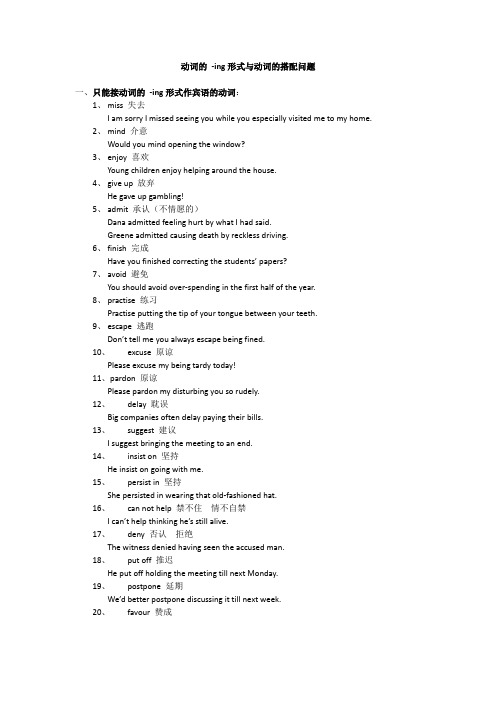
动词的-ing形式与动词的搭配问题一、只能接动词的-ing形式作宾语的动词:1、miss 失去I am sorry I missed seeing you while you especially visited me to my home.2、mind 介意Would you mind opening the window?3、enjoy 喜欢Young children enjoy helping around the house.4、give up 放弃He gave up gambling!5、admit 承认(不情愿的)Dana admitted feeling hurt by what I had said.Greene admitted causing death by reckless driving.6、finish 完成Have you finished correcting the students’ papers?7、avoid 避免You should avoid over-spending in the first half of the year.8、practise练习Practise putting the tip of your tongue between your teeth.9、escape 逃跑Don’t tell me you always escape being fined.10、excuse 原谅Please excuse my being tardy today!11、pardon 原谅Please pardon my disturbing you so rudely.12、delay 耽误Big companies often delay paying their bills.13、suggest 建议I suggest bringing the meeting to an end.14、insist on 坚持He insist on going with me.15、persist in 坚持She persisted in wearing that old-fashioned hat.16、can not help 禁不住情不自禁I can’t help thinking he’s still alive.17、deny 否认拒绝The witness denied having seen the accused man.18、put off 推迟He put off holding the meeting till next Monday.19、postpone 延期We’d better postpone discussing it till next week.20、favour赞成21、Understand 明白I can understand her wanting to live alone and be independent.22、Risk 冒险I can’t help wondering whether we should risk going without raincoats.23、Keep 保持News of successes keeps pouring in.24、Fancy 想象Sorry, but I don’t fancy going out tonight.25、Endure 容忍忍受The lazy bones didn’t fancy getting up at 4 o’clock every morning.26、Dislike 厌恶I dislike getting up early.27、Consider 考虑He was in low ebbs and considered going away.28、Anticipate期望预料We anticipate hearing from you again.29、Appreciate 感激I really appreciate your telling me that.30、Acknowledge 承认Mr. Smith acknowledged receiving the book.31、Imagine 想象I can’t imagine him knowing all that.32、Advocate 拥护主张He doesn’t advocate getting up too early.33、Facilitate 促进是便利Tape recorder facilitates studying English.34、Involve 包括House-keeping involves cooking, washing dishes, sweeping, and cleaning.35、Resent 厌恶He resented being asked to wait.36、Detest 厌恶She said she had always detested seeing a bull fight.37、Loathe 非常厌恶I’d rather go by sea, I loathe flying.38、Ensure 保证确保I can’t ensure his being there in time.39、Can’t resist 忍不住I can’t resist seeing chocolates.40、Resent 怨恨不快Does he resent my being here?41、Evade 逃避Evade paying taxes42、Mention 介意My wife didn’t mention my writing to my private secretary.43、Forbid 禁止The law forbids selling liquor to minors.44、Contemplate 打算注视I hope you would contemplate coming with us on the trip.45、Defer 暂缓延期They deferred making a decision.46、Recall 回忆记起I can’t recall having met him before.47、Approve 批准同意Exercise 1 Put the verbs in brackets into the correct forms, choosing between the –ing participle and the infinitive:1.He was in low spirits and even considered(go) away.2.The criminal even threatened (murder) the president.3.Practise (put) the tip of your tongue between your teeth and blowing: You will pronounceperfect th’s!4.You must endeavour __________ (explain) yourself more clearly, it is impossible _________(understand) what you are trying _________ (say).5.Bob contemplated _____________ (go) to Africa after graduation.6.I can’t help __________ (wonder) whether we should risk ________ (go) without raincoats.7.Don’t tell me you always escape __________ (be) fined because you have a very fast sportscar!8.Leave off ________ (bite) your nails.9.My mother detested ___________ (go) to classical concerts so I never learned ________(appreciate) classical music until I was old enough ___________ (start) a collection of records.10.He didn’t feel like _________ (work) so he suggested _________ (spend) the day in thegarden.11.You still have a lot _________ (learn) if you’ll forgive my ________ (say) so.12.Tim decided ___________ (put) broken glass on top of his wall ________ (prevent) boys________ (climb) over it.13.You certainly mustn’t miss ________ (see) this wonderful film.14.Do you recollect/recall ___________ (tell) John about the new house?15.The doctor advised ___________ (take) the car.16.I could not imagine that ________ (be) possible.二、即可接动词–ing形式,又可接动词不定式作宾语的动词:(一)接两种形式,意义无太大区别的动词如表示一般行为,用分词结构作宾语为多,如表示特定的活具体的动作,则用不定式作宾语为多。
动词ing做宾补-表语-定语-状语及综合练习
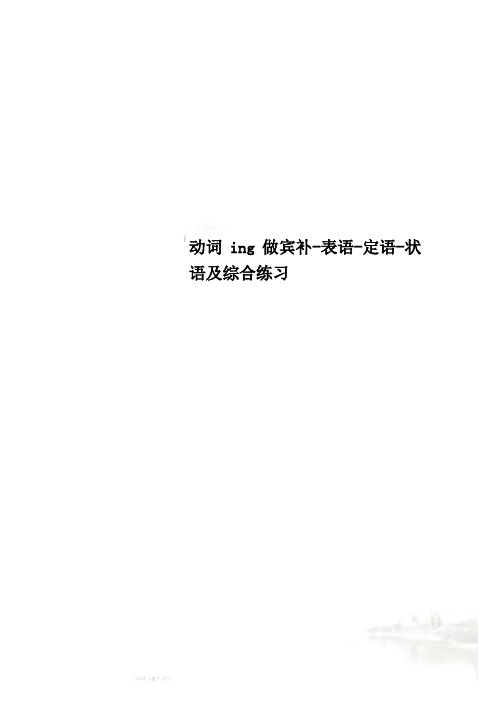
动词ing做宾补-表语-定语-状语及综合练习2高中英语语法动词ing形式做宾补表语定语状语用法详解及练习第一部分:动词的-ing形式作宾语补足语1.动词的-ing形式可以在see, hear, notice, watch, feel, smell, look at, listen to, observe, find 等表示感官和心理状态的动词后面作宾语补足语,和一个名词或代词一起构成复合宾语。
We heard the children shouting upstairs. 我们听见孩子们在楼上叫喊。
I noticed a man running out of the bank when I got off the car. 我下车的时候注意到一个男人从银行里跑出来。
I felt my heart beating violently. 我觉得我的心在猛烈地跳动。
2.动词的-ing形式和不定式作宾语补语的区别在see, hear, feel, watch, notice等感官动词后,既可用动词的-ing形式构成复合宾语,也可用不定式构成复合宾语,两者之间有一定的区别。
用动词的-ing形式时,表示动作正在进行;用不定式时,表示动作发生了,即动作的全过程结束了。
He saw a girl getting on the car. 他看见一个女孩在上汽车。
(She was getting on the car.)He saw a girl get on the car and drive off. 他看见一个女孩上车开走了。
(She got on the car and drove off.)Do you hear someone knocking at the door 你听见有人在敲门吗?(Someone is knocking at the door.)Do you hear someone knock at the door 你听见有人敲门了吗?(Someone knocked at the door just now.)提示:如果宾语补足语是一系列的动作,通常只能用不定式来表示,不用动词的-ing形式。
ing的练习题六年级

ing的练习题六年级在此练习题中,我们将探索一些有关-ing形式的用法和用途。
请注意,本文将不使用“练习题六年级”这样的标题或小标题。
ING的练习题一、动词+ing形式表示进行中的动作在英语中,我们可以使用动词+ing形式来表示进行中的动作。
例如:1. Mary is playing basketball in the park.2. The dog is chasing its tail around the backyard.二、动词+ing形式作为主语动词+ing形式可以作为句子的主语。
例如:1. Swimming is my favorite hobby.2. Singing in the shower always makes me feel happy.三、动词+ing形式作为宾语动词+ing形式也可以作为句子的宾语。
例如:1. I enjoy reading books in my free time.2. She hates doing homework every day.四、动词+ing形式作为形容词动词+ing形式也可以作为形容词,用来描述人或物。
例如:1. The running water is so refreshing.2. The screaming child is causing a disturbance.五、动词+ing形式作为副词动词+ing形式还可以作为副词,修饰动词、形容词或副词。
例如:1. He drove home, singing loudly all the way.2. She smiled at me, encouragingly.六、动词+ing形式作为介词宾语动词+ing形式也可以作为介词的宾语。
例如:1. I am looking forward to working with you.2. John apologized for arriving late to the meeting.七、动词+ing形式作为定语动词+ing形式还可以作为名词的定语,说明名词的性质或特征。
动词-ing形式(专项练习)(解析版)

动词-ing形式精准训练一、单选题1. I still remember to the Famen Temple and what I saw there.A. to takeB. to be takenC. takingD. being taken1. 【解析】 D 记得做过某事要用动词的-ing形式,I与take之间被动的关系,所以D项正确。
2. There are hundreds of visitors _______ in front of the Art Gallery to have a look at Van Gogh’s paintings.A. waitedB. to waitC. waitingD. wait2. C【解析】本题考查现在分词作后置定语。
“正在等候的参观者”,所以选C项。
3. Listen! Do you hear someone __________for help?A. callingB. callC. to callD. called3. A 【解析】该空所填内容在句中为非谓语动词作宾语补足语,根据someone与call的主动关系判断,排除D项。
hear后接不定式作宾语补足语时应省略to,由此排除C项。
由listen可判断出此处表示有人正在求救,可排除B项,故选A项。
4. He had wonderful childhood, _____with his mother to all corners of the world.A. travelB. to travelC. traveledD. traveling4. D 【解析】主语(he)与动词travel之间存在主动关系,故用traveling作伴随状语,故选D。
5. at my classmates' faces, I read the same excitement in their eyes.A. LookingB. LookC. To lookD. Looked5. A 【解析】look与其逻辑主语I之间为主动关系,因此用looking。
动词--ing形式的变化规则及习题

4. 你的朋友们正在干什么? ________ ________your friends________? 5. 你经常出去吃饭吗? ________you often_________ _______? 答案: 4. What are; doing 5. Do; eat out
jump—(jumping)
sleep—( sleeping)
climb—(climbing )
fight—( fighting )
run —(running)
swim—( swimming )
shop—(shopping )
get—(getting )
put —(putting )
write—( writing )
例如: play—playing watch—watching
2) 以不发音的e 结尾,去e 加-ing
例如: take—taking come—coming
3) 元音+辅音结尾,且是重读闭音节的单词,双写辅音字母加
-ing
例如:run—running swim—swimming
小练习,写出下列动词的ing 形式.
make—(making )
play—( playing )
skate—(skating)
watch—( watching)
2. 现在进行时的构成。 现在进行时的构成: be+动词的-ing形式。 肯定句: 主语+be+动词的-ing形式+其他。 否定句: 主语+be+not+动词的-ing形式+其他。 一般疑问句: Be+主语+动词的-ing形式+其他。 特殊疑问句: 特殊疑问词+be+主语+动词的-ing形 式+其他。
高中英语必修课-----动词--ing形式作主语和宾语知识讲解及巩固练习题(含答案解析)
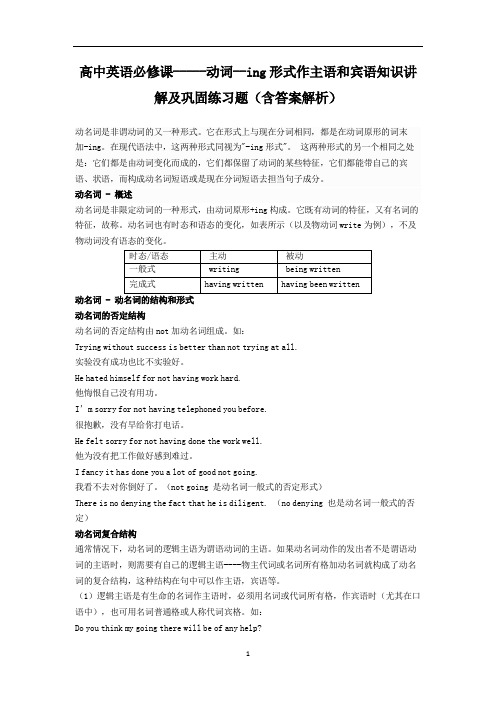
高中英语必修课-----动词--ing形式作主语和宾语知识讲解及巩固练习题(含答案解析)动名词是非谓动词的又一种形式。
它在形式上与现在分词相同,都是在动词原形的词末加-ing。
在现代语法中,这两种形式同视为"-ing形式"。
这两种形式的另一个相同之处是:它们都是由动词变化而成的,它们都保留了动词的某些特征,它们都能带自己的宾语、状语,而构成动名词短语或是现在分词短语去担当句子成分。
动名词-概述动名词是非限定动词的一种形式,由动词原形+ing构成。
它既有动词的特征,又有名词的特征,故称。
动名词也有时态和语态的变化,如表所示(以及物动词write为例),不及物动词没有语态的变化。
动名词-动名词的结构和形式动名词的否定结构动名词的否定结构由not加动名词组成。
如:Trying without success is better than not trying at all.实验没有成功也比不实验好。
He hated himself for not having work hard.他悔恨自己没有用功。
I’m sorry for not having telephoned you before.很抱歉,没有早给你打电话。
He felt sorry for not having done the work well.他为没有把工作做好感到难过。
I fancy it has done you a lot of good not going.我看不去对你倒好了。
(not going是动名词一般式的否定形式)There is no denying the fact that he is diligent.(no denying也是动名词一般式的否定)动名词复合结构通常情况下,动名词的逻辑主语为谓语动词的主语。
如果动名词动作的发出者不是谓语动词的主语时,则需要有自己的逻辑主语----物主代词或名词所有格加动名词就构成了动名词的复合结构,这种结构在句中可以作主语,宾语等。
动词ing形式作表语,定语和宾语补足语

概念引入The music they are playing sounds so exciting .We watched three boys sharing their food with eachOur job is playing all kinds of music .The girl singing now is a classmate of mine用法讲解非谓语动词中的ing形式包括两种:一种是动名词,另外一种是现在分词。
•基本形式:1、-ing形式作表语1)-ing形式作表语时放在系动词之后,用来泛指某种动作或行为,以说明主语的具体内容(身份、性质或情况)。
如:Her hobby is painting她的业余爱好是画画。
My job is looking after the children我的工作就是照顾这些孩子。
2)-ing用来表示主语所具有的特征,如:His concern for his mother is most touching他对母亲的关爱很感人。
His words are encouraging.他的话很鼓舞人。
2、-ing形式作定语1).说明被修饰名词的作用和用途,如:building materialsmaterials for building 建筑材料drinking water=water for drinking 饮用水a reading room=a room for reading 阅览室2).说明被修饰名词的性质和程度,如:tiring music=music that is tiring 烦人的音乐a surprising result=a result that is surprising一个惊人的结果3).表示被修饰名词正在进行的动作,如:正在做实验的那个学生是我们的班长。
The student making the experiment is our monitor.我们能看到冉冉升起的太阳。
动词ing形式的变化规则及习题

Ⅱ. 完成句子 1. 妈妈正在洗衣服。 My mother________ ________ ________. 2. 你的叔叔正在喝茶吗? ________your uncle________ tea? 3. 让我们8点去钓鱼吧。 ________go fishing________ eight o’clock. 答案: 1. is washing clothes 2. Is; drinking 3. Let’s; at
(二)现在进行时的时间状语及标志性词 (1)now现在 (2)at this time在这时 (3)at the moment现在 (4)look看(常用于句首) (5)listen听(常用于句首)
【学以致用】 用所给动词的适当形式填空 1. My parents________ (watch)TV in the living room now. 2. Don’t talk. My little brother________ (sleep)in the next room. 3. Listen, some girls________ (sing)in the music room. 4. Be quiet, please. They________ (study)for the test. 5. He often________ (go)to school at seven in the morning. 答案: 1. are watching 2. is sleeping 3. are singing 4. are studying 5. goes
4. 你的朋友们正在干什么? ________ ________your friends________? 5. 你经常出去吃饭吗? ________you often_________ _______? 答案: 4. What are; doing 5. Do; eat out
第十三章动词-ing形式(思维导图+知识梳理+好题精炼)2022-2023初中英语中考语法归纳

第十三章动词-ing形式思维导图知识梳理一、动名词的定义动词-ing形式分为两类:动名词和现在分词.动名词在句中起名词作用,现在分词在句中起形容词或副词作用.动名词是一种动词的非谓语形式,它兼有动词和名词的特征,由动词原形加词尾-ing而成,其构成法与现在分词一样.动名词有时态和语态的变化.(以do为例)二、动词-ing 形式的句法作用从性质上讲,动词的-ing形式相当于名词、形容词、副词.因此,它在句中可用作主语、表语、定语、宾语、状语和宾语补足语.(一)作主语动词-ing形式作主语通常表示一种抽象的动作概念,即泛指某种行为或动作.Eating too much is bad for your health.吃得太多对身体健康有害.Is playing basketball after lunch good or bad for your health?吃完午饭就打篮球对身体健康有益还是有害?Travelling abroad can widen one's outlook.出国旅行会扩大人们的视野.点拨(1)动词-ing形式短语作主语,通常有两种位置:一是放在句首,如上述例句所示;一是用it作形式主语,而将-ing分词短语移到谓语部分之后,以避免句子结构头重脚轻.Having his brother here will make him happier.It will make him happier having his brother here.让他的兄弟待在这里将会使他高兴一些.Swimming in this river is dangerous.It is dangerous swimming in this river.在这条河中游泳很危险.(2)动词-ing形式作主语还可以用于“There is no+-ing形式”(····是不可能的)结构.There is no smoking here.这里不许吸烟.There is no joking about such matters.这件事开不得玩笑.(二)作表语动词-ing形式(短语)作表语有时起名词作用,泛指动作,有时起形容词作用,指主语的性质、状态.His hobby is collecting stamps.他的爱好是集邮.The news is exciting.这消息令人兴奋.The food smells inviting.这道菜香味怡人.My favourite sport is playing table tennis.我最喜欢的运动是乒乓球.The only thing she is interested in is dancing.她唯一感兴趣的就是跳舞.点拨不要把作表语的-ing形式与进行时态相混淆.-ing形式作表语表示主语的某种特征,而进行时态则表示正在进行的动作.试比较:Her job is teaching.她的工作是教书.(teaching是表语)She is teaching there now.她正在那儿上课.(is teaching是现在进行时态)(三)作定语动词-ing形式作定语只表明它所修饰的词的用途、所属关系等,置于被修饰词之前.a working method 工作方法 a dining car 餐车a swimming pool 游泳池building materials 建材(四)作宾语在某些动词:suggest, finish, avoid, stop, can't help, mind(在乎),admit, advise,consider, deny, enjoy, require, postpone, delay, practise, fancy, excuse, pardon, miss(错过)等后面不能用不定式,而必须用动名词作为宾语.I can't help laughing.我禁不住笑了起来.Return the book to the library as soon as you finish reading it.你一看完这本书就还回图书馆.He enjoys watching TV plays.他喜欢看电视剧.点拨有些动词后既可用动名词,也可用不定式.在动词love, like, begin, start, continue等后,既可用动名词作宾语,也可用不定式作宾语,有时两种结构的意义差别不大.(五)作宾语补足语动词的-ing形式用作宾语补足语,常用在:see, hear, notice, watch, keep, find, feel, get, have等动词之后,与一个名词或代词构成复合宾语;其中宾语和宾语补足语是主谓关系.I saw him walking across the street.我看见他穿过街道.He kept me waiting for a long time.他让我等了很长时间.We watched the army marching down the street towards the park.我们观看部队沿街道朝公园行走.I heard her playing the piano.我听见她在弹钢琴.点拨在see, hear, feel, watch, notice等动词之后,既可用动词-ing形式也可用(不带to的)动词不定式作宾语补足语:如用动词-ing形式,通常表示动作正在进行;用动词不定式,则表示(或强调)动作从开始到结束的全过程.(六)作状语动词的-ing形式短语作状语时,通常都表示主语正在进行的另一动作,用来对谓语动词表示的动作加以修饰或作为陪衬,它可表示时间、原因、结果、条件、让步、方式或伴随动作,相当于相对应的状语从句.Seeing the teacher entering the room, the students stood up. =When the students saw the teacher entering the room, they stood up.学生(们)看见老师进房间,都站了起来.(两个动作同时发生)Being ill, I went home.=Because I was ill, I went home.由于生病,我回家了.The snow lasted a week, resulting in a serious traffic confusion in the whole area.=The snow lasted a week, so it resulted in a serious traffic confusion in the whole area.雪下了一个星期,造成整个地方的严重交通混乱.Be careful when crossing the street.过马路时,要小心.The students walked out of the classroom, laughing and talking.学生们有说有笑走出教室.点拨动名词也可以和about, against, at, before, after, by, besides, for, from, in, on, upon, without等介词构成短语,作状语用.Without saying good-bye, she left him.未告别,她就离开了他.After reading the passage twice, he began to do the exercises.这段文章看了两遍后,他就开始做练习了.Upon returning from Beijing, he went to visit his friend.从北京一回来,他马上就去拜访朋友.三、-ing分词的否定式-ing分词是动词的一种非限定形式,其否定式是一律在其前面加否定词“not”或“never”构成.如:I think it will do you a lot of good not going.我觉得不去对你会有好处的.I left at noon, not staying for lunch.我是中午走的,没有留下来吃午饭.I'm sorry for not having informed you of the meeting.抱歉没通知你开会.I regret not having gone together with her.我后悔没有跟她一起去.四、-ing分词常用于下列句型中It's no use... It's no good...Having difficulty/ trouble... There is no...It's no use doing experiments but not considering the results.不考虑结果做实验没有用.It's no good not combining theory with practice.不把理论和实践结合就没有用.I have trouble running a long distance.我跑长跑有困难.There is no denying the fact that we are still backward.不容否认,我们仍然落后.五、动名词的独立主格结构-ing分词也可以用于独立主格结构,由“主格名词或代词+-ing分词”构成,表示时间、条件、原因、伴随情况等.The clock striking eight, they began working.时钟敲了8响,他们就开始工作了.(表示时间)The weather being fine, we went for a walk.由于天气好,我们出去散散步.(表示原因)Time permitting, we'll come to see you. 如果时间允许,我们就来看你.(表示条件)也可由“with/without+宾语+-ing分词”构成独立主格结构,表示伴随情况.如:You must not sit with your feet pointing at another person.坐着时不要把脚朝着别人.六、动名词作宾语和动词不定式作宾语含义不同部分动词可加动名词作宾语,也可加动词不定式作宾语,但意思不同,如:(一)remember doing sth.表示“记得过去做过的一件事”,remember to do sth.表示“记得要去做某事”I remember seeing him once somewhere.我记得在哪里见过他一次.Remember to see him before he goes away.记住在他离开之前看他.(二)regret doing sth.表示“对过去做过的事情后悔”,regret to do sth.表示“对还没做或将要做的事情表示遗憾”I regret telling you the bad news.我后悔把这个坏消息告诉你.I regret to say I'm unable to help you.很抱歉我不能帮助你.(三)stop doing sth.表示“停止正在做的事情”,stop to do sth.表示“停止什么,然后去做另一件事情”Let's stop talking about it.咱们停止谈论这件事情吧.We stopped to see what happened.我们停下来去看发生了什么事情.(四)forget doing sth.表示“忘记曾做过某事”,forget to do sth.表示“忘记去做某事”I forgot giving the letter to her.我忘了,已经把信给她了.I forgot to post the letter.我忘记发信了.(五)try doing sth.表示“尝试着做某事”,try to do sth.表示“设法做某事”Let's try doing the work some other way.我们用别的方法做这工作试试.We must try to get everything done in time.我们必须设法及时把一切搞好.(六)mean doing sth.表示“意味着,意思是”,mean to do sth.表示“打算、想要”This means helping you.这意味着帮助你.I mean to help him with it.我打算帮助他做这件事情.七、一些与动词-ing 形式有关的短语(一)表示有目的、有意识地进行练习或训练某项技能:do+(some)+v.-ingdo some reading 读读书do some running跑跑步do some writing练练字This year I am going to do more speaking.今年我要多练口语.(二)表示做一些笼统、不具体指明的事:do+(some)+v.-ingdo some shopping 去商店买东西(不指明买哪样具体的东西)do some washing 洗东西do some cooking 做饭do some cleaning 扫除do some sewing 缝纫(三)“go+ v.-ing形式”大部分表示从事运动、消遣或娱乐活动go dancing 去跳舞go swimming去游泳go skating 去滑冰go skiing 去滑雪go shooting去射击go boating去划船go fishing去钓鱼go hunting去打猎go riding去骑马go walking去散步go running去跑步go sailing去航海八、-ing分词时态及语态(一)-ing分词的特点:-ing分词的时态分为一般式和完成式.一般式所表示的动作与谓语动词的动作往往同时发生.完成式所表示的动作发生在谓语动词的动作之前.He insisted on finishing the work before going home.他坚持在回家前一定要先完成工作.He didn't mention having met me.他没提及已见到了我.I still remember having ever worked together with him.我还记得曾经与他一起共过事.(二)-ing分词的语态-ing分词的被动语态也有一般式和完成式两种.The large house being built near the factory is a new hospital.工厂附近正在施工的大楼是一座新的医院.Having been sent to the wrong address, the letter did not reach her.那封信投错了地址,她没有收到.好题精练选择填空1.Taking pictures_________ very interesting.A. isB. areC. to beD. be2. _________ the bad news made him cry.A. HearB. HeardC. HearingD.Is hearing3. _________ a desert had always been a risk adventure.A. being crossed .Having crossed C. Crossing D. To have crossed4.Before he came, I'd finished_________ the whole book.A. to readB. to have readC. readingD. read5.I always enjoy_________ to popular music at night.A. to listenB. listeningC. that I can listenD. if I can listen6.We are considering_________ a trip around the island.A. takeB. to takeC. to be takingD. taking7.I hope you don't mind_________ at your newspaper.A.I lookB. my lookingC.I lookingD. my to look8.When a man's heart stops_________, he dies.A. to beatB. beating C .beat D. beaten9.I can't help_________ he is still alive.A. thinkingB. thinkC. to thinkD. thought of10.So far as I am concerned , I prefer readingA. than meatB. for joyC. instead of sleeping D to drinking11.It goes without_________ that knowledge is important.A. talkingB. tellingC. sayingD. mentioning12.we are looking forward_________ our friends next week.A .to see B. to seeing C. to be seeing D. shall see13.He spent a lot of money_________ books and magazines.A. buyB. buyingC. to buyD. bought14.The silkworm is an insect worth_________.A. to knowB. knowingC. to be knownD. being known15.She went out without_________ good-bye to us.A. sayB. to sayC. sayingD. being said16.The curious student kept on_________ questions.A. asksB. askingC. to askD. asked17.He is such a strange person; there's_________ what he'll do next.A. no knowingB. not to knowC. not knownD. being unknown18.When she heard the bad news, she burst_________.A. into cryingB. out to tearsC. cryingD. out crying19.You must never cross the street without_________ the light to turn green.A. waitingB. to waitC. waiting forD. to wait for20.Scientists succeed_________ protein out of old newspapers.A .to make B. at making C. making D. in making21.I became_________ after watching too much television.A. boredB. boringC. boreD. bores22.I felt_________ by his interest in my new invention.A. encourage B to encourage C. was encouraged D. encouraged23.He sat there_________ a novel.A. readB. readingC. readsD. had read24.Don't wake up the_________ child.A. sleepB. sleptC. sleepingD. sleepy25.A proverb goes:"A_________ stone gathers no moss”.A. rollB. rollingC. rolledD. rolls26.The heavy rain kept us_________ for two hours.A. waitB. waitedC. waitingD. to wait27.I found a dog_________ over by a car on the road.A. to run B .run C.ran D. running28.We found the baby_________ on the floor.A. sleptB. sleepC. asleepD. sleeping29.Jack saw a woman_________ near the dog, so he walked up to her.A. stoodB. standsC. to standD. standing30.They got their ca_________ at the garage.A. be washedB. washedC. being washedD. to have been washed 31_________ with his report, I told him to write it all over again.A. DissatisfactoryB. Not being satisfiedC. Having not satisfiedD. Dissatisfying32. _________ our shoes in our hands, we crossed the stream.A. To carryB. CarryingC. CarriedD. Carry33. _________ my homework, I went home.A. Having finishedB. FinishedC. Being finishedD. Finish34. _________ the door unlocked, I went in.A. FindingB. FoundC. Had foundD. Have found35. _________ a careless fellow, he forget all about it.A. IsB. BeC. BeingD. Was答案:1-5 ACCCB 6-10 DBBAD11-15 CBBBC 16-20 BADCD 21-25 ADBCB 26-30 CBCDB 31-35 BBAAC。
动词的ing或ed形式做定语讲解与练习总结

用作定语时,动词的-ing形式既包括动名词又包括现在分词, 动词的-ed形式仅是动词过去分词。
动词的-ing形式做定语在句中通常有两个位置,如果是单个的动词的-ing形式做定语,常放在被修饰词前做前置定语;如果是动词的-ing形式的短语做定语,常放在被修饰词后做后置定语。
如:1.He is an attacking player.他是一个攻击型的运发动。
(表示运发动的特征)2.He asked an embarrassing question.他提了一个令人难堪的问题。
(表示“令人….〞)3.A little child learning to walk often falls.学走路的小孩常常跌跤。
(表示被修饰词的动作或状态,动词短语后置)4.Do you know the number of people coming to the party你知道来参加晚会的人数吗(表示被修饰词的动作或状态,动词短语后置)注意:当-ing形式做后置定语时,可以相当于相应的定语从句。
如:1.A young man writing novels came to speak to us yesterday.→A young man who writes novels came to speak to us yesterday.一位写小说的青年昨天来向我们作报告。
2.The girl sitting next to me was my cousin.→The girl who was sitting next to me was my cousin.坐在我旁边的姑娘是我表妹。
另外需要注意的是上面做定语的动词-ing形式表示的动作是正在进展的工作或习惯性的动作,如果和主句谓语的动作不能同时发生时,那么不能用-ing形式做定语而必须用定语从句形式。
如:昨天来我们学校的那位教授在明天给我们做报告。
3.The professor who came to our school yesterday will give us a lecture tomorrow.不正确的表述:The professor coming to our school yesterday will give us a lecture tomorrow.总结:-ing形式做定语通常从以下三方面考察,即:1)说明被修饰词的性质,特征或用途。
动词ing形式的用法与练习题(归纳整理-含答案)

The boy was walking, with his father following.
在“名词(或代词)+介词短语”构成的 独立主格结构中,一般不用形容词性物主 代词和冠词。
Miss Smith entered the classroom, book in hand. Miss Smith entered the classroom, with a book in her hand.
区别 see sb. doing sth 是指”看见某人正在做某事”,不是全过 程,表正在进行 see sb. do sth 是指”看见某人做过某事”是看着事情的发 生全过程, 是看见某人做某事
例句 I saw her clean the classroom. 是说我看到她打扫教室了。(强调做过这件事)
chatting.
He worked late yesterday, preparing for the
lecture. (2)-ing分词可以作时间状语,常放在句首,
如: (When)Walking in the street,I caught sight of
a tailor's shop.
(After )Finishing my work, I went out. Having told us a funny story, the teacher went on to explain the text to us
is standing at the gate
另外,-ing分词的完成式不能作定语。例如 不可以说:The man having written many books is a former student of our school.应改为
非谓语动词 V-ING用法小结附练习

动词的ing形式作表语,定语,宾补和状语一、动词-ing形式作表语1. 表示主语的内容,可以转换到句首作主语Her job is keeping the lecture hall as clean as possible. (= keeping the lecture hall as clean as possible is her job)她的工作是尽量使报告厅保持干净。
2. 表示主语具有的特征、性质和状态(动词ing 相当一个形容词)The problem is quite puzzling.这个问题很令困惑。
3.常用来作表语的现在分词有astonishing, amusing, confusing, disappointing, boring, encouraging, inspiring, moving, tiring, interesting, surprising等。
全析提示:动词-ing形式作表语时,其逻辑主语往往是句子中的主语,但用作表语的-ing形式也可带有自己的逻辑主语。
What worries me most is her staying too late every night. (staying too late every night的逻辑主语是her)二、动词-ing形式作定语1 单个的动词-ing形式可以作前置定语,一般具有两种含义。
①说明被修饰名词的用途和性能。
a reading room = a room which is used for reading 阅览室running shoes =shoes for running 跑鞋a working method =a method for working 工作方法②表示所修饰的人或物的动作或状态,在意思上接近一个定语从句,可以表示正在进行的动作,也可表示经常性动作或当时的状态。
developing countries = countries that are developing发展中国家an ordinary-looking house = a house that looks ordinary看起来很普通的房子a puzzling problem = a problem that puzzles somebody困扰人的问题2 作定语的动词-ing形式如是一个短语,则应放在被修饰词的后面,做后置定语,相当于一个定语从句。
初一动词--ing形式的变化规则及习题

【基础达标】 Ⅰ. 选择方框内的词并用其适当形式填空
read, wash, play, eat, drink 1. Look! The girl is________ a book over there. 2. —What is your brother doing? —He is________ a hamburger at the table. 3. —Does your father________ tea every day? —Yes, he does. 4. —Do you like________ clothes at home, Susan? —No, but I have to. 5. A lot of boys________ basketball on the playground now. 答案: 1. reading 2. eating 3. drink 4. washing 5. are
小练习,写出下列动词的ing 形式.
jump—(jumping)
sleep—( sleeping)
climb—(climbing )
fight—( fighting )
run —(running)
swim—(swimming )
shop—(shopping )
get—(getting )
put —(putting )
4. 你的朋友们正在干什么? ________ ________your friends________? 5. 你经常出去吃饭吗? ________you often_________ _______? 答案: 4. What are; doing 5. Do; eat out
v.-ing 变化规则: 1) 一般加-ing
动词ing练习题
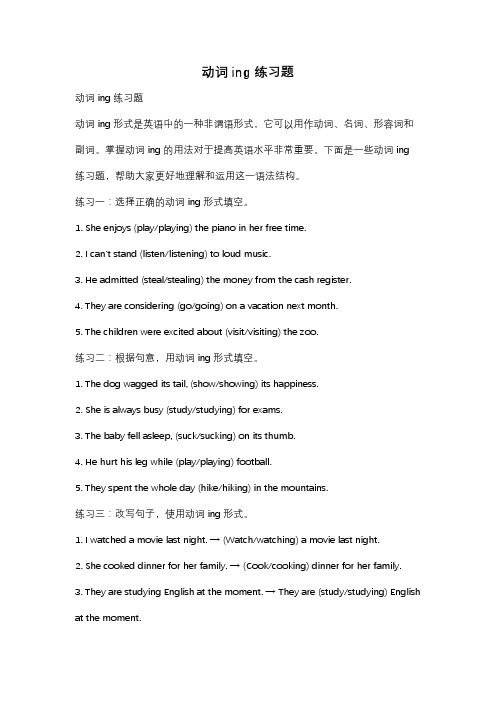
动词ing练习题动词ing练习题动词ing形式是英语中的一种非谓语形式,它可以用作动词、名词、形容词和副词。
掌握动词ing的用法对于提高英语水平非常重要。
下面是一些动词ing练习题,帮助大家更好地理解和运用这一语法结构。
练习一:选择正确的动词ing形式填空。
1. She enjoys (play/playing) the piano in her free time.2. I can't stand (listen/listening) to loud music.3. He admitted (steal/stealing) the money from the cash register.4. They are considering (go/going) on a vacation next month.5. The children were excited about (visit/visiting) the zoo.练习二:根据句意,用动词ing形式填空。
1. The dog wagged its tail, (show/showing) its happiness.2. She is always busy (study/studying) for exams.3. The baby fell asleep, (suck/sucking) on its thumb.4. He hurt his leg while (play/playing) football.5. They spent the whole day (hike/hiking) in the mountains.练习三:改写句子,使用动词ing形式。
1. I watched a movie last night. → (Watch/watching) a movie last night.2. She cooked dinner for her family. → (Cook/cooking) dinner for her family.3. They are studying English at the moment. → They are (study/studying) English at the moment.4. He opened the door and entered the room. → (Open/opening) the door, he entered the room.5. We played soccer in the park yesterday. → (Play/playing) soccer in the park yesterday.练习四:根据提示,写出含有动词ing形式的句子。
九年级英语动词-ing形式用法单选题50题

九年级英语动词-ing形式用法单选题50题1. _______ in the early morning is good for our health.A. RunB. RunsC. RunningD. Ran答案:C。
解析:本题考查动词- ing形式作主语。
在英语中,动词原形不能直接作主语,A选项Run是动词原形,B选项Runs是第三人称单数形式,D选项Ran是过去式,都不能作主语。
而动词- ing 形式可以作主语,这里Running表示跑步这个动作,作句子的主语,所以选C。
2. _______ paintings is her favorite hobby.A. PaintB. PaintsC. PaintingD. Painted答案:C。
解析:这里考查的是动词- ing形式作主语。
动词原形paint(A选项)和第三人称单数形式paints(B选项)以及过去式painted D选项)都不能直接作主语。
只有动词- ing形式Painting可以作主语,表示绘画这个动作,所以答案是C。
3. _______ football every day helps him keep fit.A. PlayB. PlaysC. PlayingD. Played答案:C。
解析:此题为动词- ing形式作主语的考查。
动词原形play A选项)、第三人称单数形式plays B选项)和过去式played D选项)都不符合语法规则来作主语。
Playing作为动词- ing形式,可以表示踢足球这个动作作句子的主语,所以选择C。
4. _______ stories is a great way to express creativity.A. WriteB. WritesC. WritingD. Wrote答案:C。
解析:本题重点在于动词- ing形式作主语。
Write是动词原形(A选项),Writes是第三人称单数形式(B选项),Wrote是过去式(D选项),它们都不能在句子中作主语。
- 1、下载文档前请自行甄别文档内容的完整性,平台不提供额外的编辑、内容补充、找答案等附加服务。
- 2、"仅部分预览"的文档,不可在线预览部分如存在完整性等问题,可反馈申请退款(可完整预览的文档不适用该条件!)。
- 3、如文档侵犯您的权益,请联系客服反馈,我们会尽快为您处理(人工客服工作时间:9:00-18:30)。
主动形式
被动形式
一般式 doing
being done
完成式 having done having been done
否定式: not+ --ing/not having(been) done 不是 having not (been) done
2. 一般式和完成式的用法
had enjoyed his stay here.
A. having added B. to add
C. adding
D. added
6.“ Can’t you read?” Mary said __A_ to the notice. A. angrily pointing B. and pointed angrily C. angrily pointed D. and angrily pointing
regret 遗憾去做某事
后悔做过某事
mean 打算/想做某事 意味着做某事
go on (做完某事)接着去 继续做同一件事 做另一件事
stop 停下来去做另一件事 停止做一件事
try 努力去做某事
试着做某事
3)--ing 分词作表语。如: Our job is playing all kinds of music. The music they are playing sounds so exciting.
8. The computer center, _D__ last year, is very popular among the students in this school.
A. open B. opening C. having opened D. opened
9. The first textbooks_D__ for teaching English as a foreign language came out in the 16th century.
is standing at the gate
另外,-ing分词的完成式不能作定语。例如 不可以说:The man having written many books is a former student of our school.应改为
The man who has written many books is…
(2)所修饰词的性质特征。如: exciting news 令人激动的消息 a moving story 一个令人感动的故事
(3)所修饰名词正在进行的动作,可以换成定语 从句形式。如:
a sleeping child (=a child who is sleeping) 正睡觉的孩子
a walking man (= a man who is walking) 正散步的男人 注:分词短语作定语须放在所修饰词之后,例 如:the man standing at the gate=the man who
He turned off the light, seeing nothing.
5. -ing分词的复合结构 物主代词/人称代词/名词所属格或普通名词 +ing分词
(1) 作主语(须用物主代词或名词所属格)
His/Tom’s not being chosen made us disappointed.
Walking across the street, a car knocked him down.应改为:
Walking across the street, he was knocked down by a car. He walking across the street, a car knocked him down.
C. prepared D was preparing
4. She’s upstairs _D__ letters.
A. writes B. is writing
C. write D writing
5. The visiting Minister expressed his
satisfaction with his talks,C__ that he
5) 在see,hear,feel,watch,notice等感官动词后 可以用-ing形式做宾语补足语。这时-ing 形式 和句子的宾语之间存在着逻辑上的主谓关系, 并且-ing 形式表示宾语正在进行的动作。如:
He saw a boy climbing the tree. Do you hear someone knocking at the door? 有人敲门你听见了吗?
a tailor's shop.
(After )Finishing my work, I went out. Having told us a funny story, the teacher went on to explain the text to us
(3)-ing分词可以作原因状语,常放句首。 如: Being ill, he can't go to school. Not knowing her address, we couldn't get in
注:一般来讲,--ing分词作表语有两种情况, 一是名词性,这时主语和表语可以互换。即: Playing all kinds of music is our job. 二是形容词性,表示主语的性质和特征, 主表不可互换。
4) -ing分词作定语可以表示 (1) 所修饰名词的用途。如: a waiting room(=a room for waiting) 候车室 a walking stick(=a stick for walking) 手杖 a sleeping car (= a car for sleeping) 卧车
Having been praised by the teacher, he works even harder.
4. ---ing分词的句法功能
1) ---ing 分词作主语 Learning English has become a parቤተ መጻሕፍቲ ባይዱ of his life. It is no use trying to repair the ship. These holes are much too big.
(2)作宾语(除了物主代词和名词所有格,也可用普 通名词或代词宾格)
He was awakened by someone’s knocking
at the door.
They have never forgiven us going there. We don’t mind him explaining it again. My friend can’t understand your treating him like that.
要点讲解
Make them easier for you to remember !
tips
避免 错过 少延期 avoid miss put off/ postpone 建议 完成 多练习 suggest finish practise 喜欢 想像 禁不住 enjoy imagine can’t help 承认 否定 与嫉妒 admit deny envy 逃避 冒险 莫原谅 escape risk excuse 忍受 保持 不介意 stand keep mind
3. ---ing分词的被动式
当-ing 分词与它的逻辑主语构成被 动关系时,需要用被动形式。根据-ing 分词动作发生的时间,-ing分词的被动 式分为一般被动式(being done)和完成被 动式(having been done), 如:
The question being discussed is very important.
(3)作状语 (须用普通名词或主格代词,亦称 独立主格结构) Time permitting, we’ll deal with the text. The boy was playing with a ball, his mother standing nearby.
典型错误: Reading in bed in my room, someone knocked Raetathdeindgoionr.b应ed改in为m:y room, I heard someone knocking at the door. I reading in bed in my room, someone knocked at the door.
touch with her. Having lived in the city for many years, he
knows it very well.
(4)-ing分词可以作条件状语,常放句首。
Turning to the right, you’ll find the post office there. (5)-ing分词可以作结果状语,常放句末。
A. having written
B. to be written
C. being written
D. written
2) ---ing分词作宾语 以下动词必须跟---ing分词作宾语:admit/
appreciate/avoid/consider/delay/deny/dislike/enjoy /escape/excuse//fancy/finish/imagine/keep/mind/ miss/postpone/put off/practise/resist/risk/stand/ stop/ suggest/ give up/cannot help(禁不住)
Compare: Did you notice a man enter the room just now? 你注意到有个人刚才进了屋子吗?
